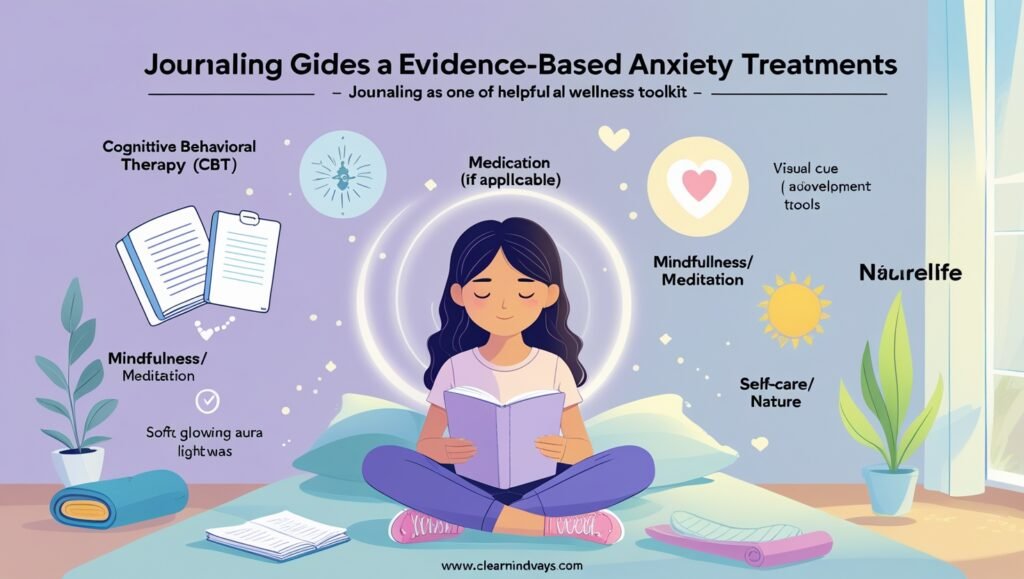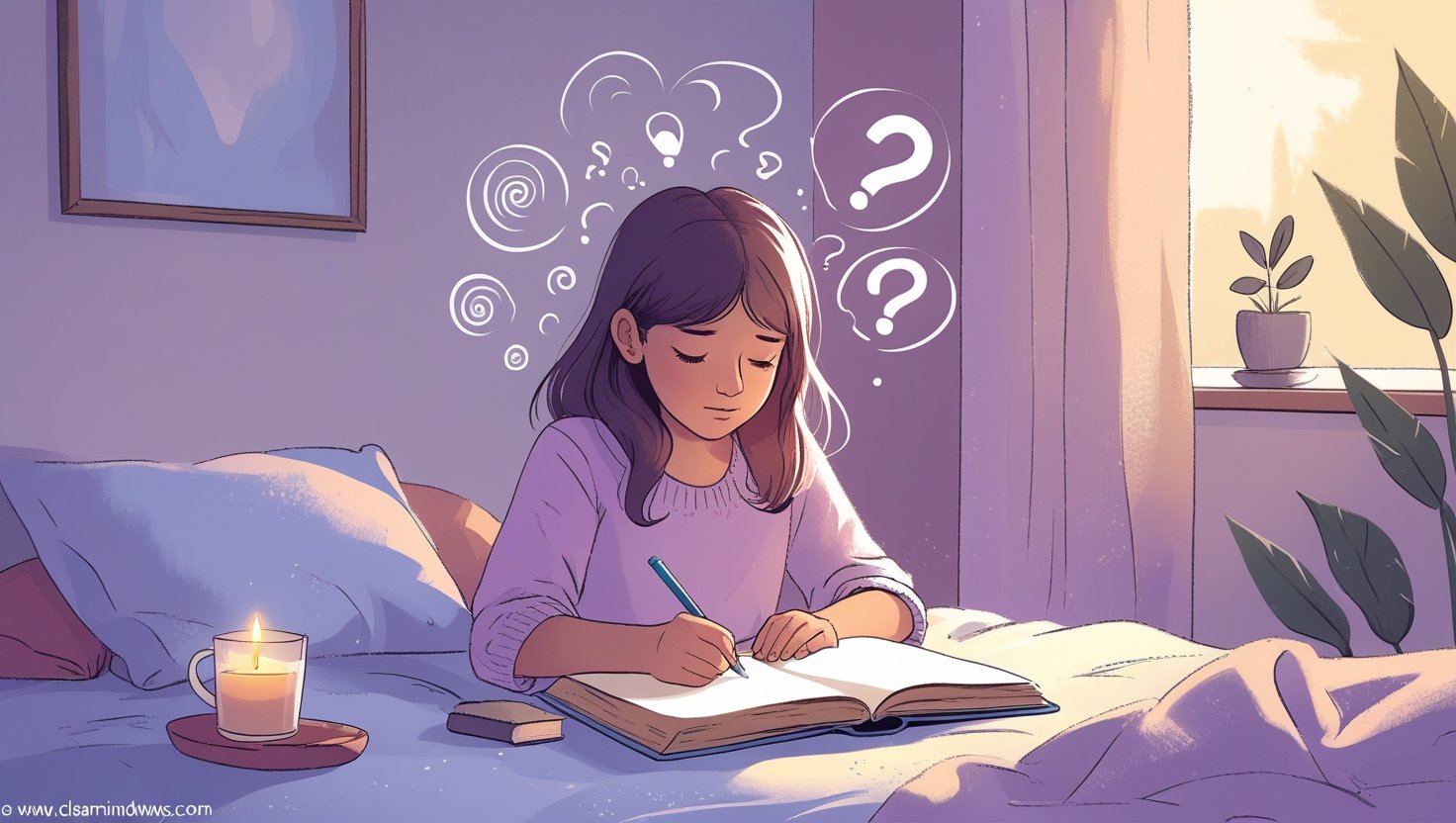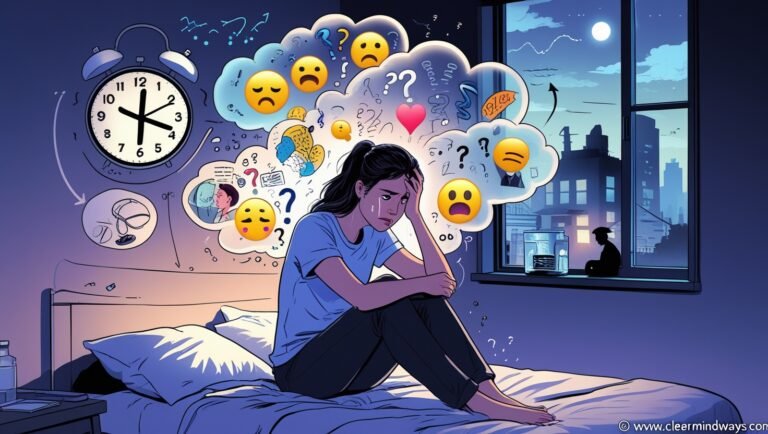How to journal for anxiety
Journaling refers to an action to write down thoughts and feelings. Studies indicate that journaling might be an effective technique to relieve stress, combat anxiety and boost overall mental health.
Racing thoughts and boiling emotions can fill people’s heads in this whirring age we live. What is more, they can freeze people from action and inaction, from doing things and taking care of themselves.
Anxiety disorders are the most common mental illness in the U.S., impacting 18.1% of the adult population ages 18 and older.
Generalized anxiety disorder and panic disorder are both anxiety disorders.
How to Journal for Anxiety
An anxiety journal is just dedicated time to put your thoughts, feelings, and experiences into a safe, non-judging place. It’s a flexible practice you can customize to suit your needs, to process an anxious thought, scan for triggers and then develop new coping strategies. Here’s how to get started:
Choose Your Medium: A physical notebook, a digital app like Notion or Day One, or even voice memos for accessibility.
Designate a Time: Work on it for 5–15 minutes every day, preferably in a quiet location. Morning journaling may set a favorable tone for the day, and evening sessions may help process events.
Write Freely or by Prompt: There is something about free writing so that ideas flow out naturally or by prompts, such as “What am I anxious about today?” or “What is one thing that I can control?” guide reflection.
Focus on Truth-Telling: Don’t shade the truth. Emotional expression, even negative emotional expression, dampens strong emotions.
Track Patterns: Read through weekly entries to see if you can spot any patterns for triggers or thoughts that you can tackle before they start.
When you get worries out of your head and onto paper it’s like clearing mental cobwebs, which invites clarity making journaling a self-care secret weapon for anxiety management.
What is Journal Writing?

Journaling is such an easy yet profound way to make sense of our thoughts and feelings. It’s like talking to yourself on paper or a keyboard: a place where you can dump out whatever’s rattling around in your head with no judgment.
Taking even 5 to 15 minutes to write can seem like a pause button, giving you an opportunity to wind down and process your thoughts one by one. It’s wonderful to see how getting things off your chest can bring clarity to your worries, make you realize patterns in your thoughts and — I suspect — even untangle some emotions you have that may be linked to your anxiety.
I think that’s what’s so helpful about journaling — it allows you to identify what’s been causing stress or anxiety. You can tell me what’s going on with you, think through what might happen next or simply let off steam about whatever is on your mind. It’s not so much about perfect words as it is about getting it out.
Health care professionals often recommend that you combine journaling with therapy or medication, and I understand why. It’s this little act of self care that you repeat every day.
Related: 100 Relatable Quotes About Overthinking to Inspire Peacefulness and Letting Go
Benefits of Journaling for Anxiety
Prevents and Calms Anxiety
Writing out thoughts and feelings can manage anxiety triggers before them become full-on panic attacks. Expressing worries and fears through writing can help to externalise fears and make them seem less overwhelming and more controllable. In the process of writing down thoughts, we often feel instant relief, gain durable perspective.
Lessens Mental Distress
Journaling is a therapeutic way of releasing your stored-up emotional energy, stress, and tension. It is this channel of emotional release, which in turn leads to the diminution of feeling of mental uneasiness and is experienced as relaxation, relief or a catharsis.
Linked to Greater Healthiness
Those who journal frequently are said to be more satisfied with life, in a better mood, and more emotionally stable. The exercise fosters introspection and self-improvement, thereby developing of self-consciousness and emotional intelligence.
Helps with Depression
The majority of those with an anxiety disorder will also have depression. Journaling can also interrupt negative thought patterns, help users recognize positive experiences and chart shifts in mood over time. This realization can be invaluable for treating depression overlapping with anxiety.
Improves Stress Management
It is more effective to process stressful events by writing about them. Writing about the experience offers a structured way to examine problems, consider possible solutions, and formulate coping mechanisms. This enables improved coping and resilience against stress.
Supports Immune Function
Studies have shown that writing expressively may build immune system function. Journaling’s calming effect might result in better physical health — such as improved sleep, decreased inflammation, and heightened immune function.
Does journaling work?
It’s kind of mind-blowing how something as simple as writing in a journal can have such a big impact on anxiety and well-being. We have good science behind all of this, and it’s not fluff, people — it’s science: whether handwriting can really change things for the better by getting you to unload what’s on your mind.
For one thing, journaling can help you determine what is causing your anxiety. A 2018 study found that emotional-focused journaling reduced anxiety, depression, and distress within a month for people with medical problems. Not bad for something that takes only a few minutes a day. It’s as if you’ve shone a light on the fears or situations that trigger you, allowing them to become more understandable and, ultimately, more manageable.

Then there’s how it soothes mental anguish. Research, including a 2021 study that focused on patients with advanced cancer, found that mindful gratitude journaling led to improved psychological distress and quality of life. It’s not about leaving the hard stuff, it’s about giving your brain a chance to process it.” When you write about your emotions, the feeling is that it unburdens you.
Journaling’s also linked with feeling better overall. A 2020 review connected writing in a gratitude journal with factoring into things like life satisfaction, happiness and lower stress. Other studies show that gratitude makes you happier, enables you to savor good experiences and improves romantic relationships. I mean, who doesn’t love a little more of that?
It’s not just anxiety — journaling can help with depression too. And a study published in 2021, also with young adults, found that using a journaling app decreased symptoms of both anxiety and depression. You’re giving your thoughts a place to go, rather than bottling them up, which can be a game changer.
Another big win: stress management. Stress and anxiety are mutually sustaining, and if you don’t address them, they’ll try to mess with your mental, physical, and emotional well-being. Journaling allows you to confront issues. One 2019 study went so far as to propose that writing about our prior failures, particularly stressful ones, could even alter how our brain processes negative emotions in the mid-cingulate cortex. It’s the part of your brain that does the heavy lifting, so it’s kind of a big deal.
And get this—keeping a journal could even give your immune system a lift. One older study found that expressive writing about a tough experience improved immune response. And there’s even evidence that it can improve lung and liver function. It’s kind of wild to see that some scribbling really could do all that to your body.
Here’s a partial list of what the research suggests journaling can do:
- Relieves anxiety: Helps you figure out triggers, and reduce symptoms (2018 study).
- Reduces mental distress: Improves psychological health, even when conditions are challenging (2021 cancer study).
- — Enhances well-being: Raises happiness, life satisfaction, gratitude (2020 review).
- Eases depression: Cuts symptoms by processing thoughts (2021 undergraduate study).
- Stress management: Assists in coping with stressors and alters brain processing of negative emotions (2019 study).
- Supports physical health: Boosts immune function and protects the health of the lungs/liver (older studies).
If you’re interested in giving it a try, you don’t need anything special — not even a notebook, really, just a napkin or a note app will do. Write about what is bugging you, what you’re grateful for or how it felt to have a tough moment. The secret is to keep it raw and to let it roll. It’s not about fixing everything; it’s about cutting yourself some slack.
Journaling tips
Establishing a regular journaling practice might seem intimidating at first, but in all honesty, it’s one of the most adaptable, forgiving methods of caring for your mental health. It’s not about being a great writer or using a fancy notebook — it’s about giving your thoughts a place to land. Here are some useful suggestions that should make it easier to slip journaling into your schedule — especially if you’re using it in conjunction with a variety of other anxiety management methods, such as therapy or medication. The following tips are based on make it simple, make it personal and make it relevant to you.
Stick to a Habit
“Journaling is most effective when it’s done consistently. Select a time and place that’s consistent — such as at your kitchen table (e.g., with your coffee in the morning) or in bed before bed — and devote as few as 5 — and up to 10 — minutes every day. That routine helps it stick. If you miss a day, no biggie — just get back on. The trick is to integrate the practice into your life, as if it were brushing your teeth.
Make It Accessible
You should have your tools easily accessible instead of running around looking for them. A notebook and pen by your bedside, or in your bag, also works really well. If you’re more techy, an notes app on your phone, or a journaling app. The lower the barrier to getting started, the more likely you are to have a go at it. And I have learned that carrying a small pocket notebook has saved me when I need to jot something down on the run.
Do What Feels Right
There is no “right” way to journal. Whether you’re putting pen to scrap paper or typing it out on a fancy phone or logging into your fancy anxiety journal, all is on the table. Some people find pen and paper slowing them down in a good way — pushing them to think about thoughts more deliberately. Others enjoy the ease of typing or recording voice memos at higher velocity. Choose what comes naturally to you — you can always change it up later.
Utilize Journal Prompts
For when staring at an empty page feels paralyzing, prompts to the rescue. They get you off to a start and can help generate insights. Free prompts, you can gather them online; you can buy a journal that comes with built-in prompts; there’s an app for daily ideas, too. How about something like, “What is one situation making me anxious today, and why?” or “What’s something I’m thankful for currently?” Choose a prompt that feels right, or use the same one for a while to get a better understanding.
Just Write What Pops in Your Head
Just let it all out — don’t pull any punches, don’t freak out about logic. I find freewriting is great for this — set a timer for 5–10 minutes and write anything that comes to mind, no editing, no judging. It’s sort of like decluttering, but for your mind. You can go back and read it later to discern patterns or insights, but even if you don’t, putting pen to paper can be a kind of release.
Explore Other Modes
Journaling doesn’t necessarily have to be paragraphs of text. If the words just aren’t flowing, instead focus for five minutes on doodling, sketching, writing a poem or just jotting down bullet points. For some people, bullet journaling offers the perfect blend of structure and creativity they need. You want to feel expressive, so experiment with what feels challenging, fun or freeing. I’ve had days when a quick doodle about how I’m feeling tells more than a whole page of words.
Track Thought Patterns
Journaling can make you aware of what you’re thinking and help you shift if those thoughts aren’t serving you, and that’s super powerful for managing anxiety. Try writing down your thoughts, keeping what they call a “thought record” in cognitive behavioral therapy. Jot down:
- The action (what’s happening?).
- Your anxieties (what has you on edge?).
- Your emotions (how’s it hitting you emotionally?).
- Any patterns in the way you think (such as “I always screw this up”).
- — Other thoughts based in reality (such as “I’ve dealt with this before”).
Eventually, this can enable you to challenge negative thoughts and embrace more balanced ones. It’s teaching your brain how to be a little bit nicer to you.
■ Here’s a tiny starter prompt that’ll help you start or restart journaling if you’re in the mood to give it a whirl:
- Beginner Journaling Prompt
- Then, set a timer for 5–10 minutes, and write about:
- What is on your mind today? It might be a worry, a win, or something else entirely.
- How does it make you feel? The feelings themselves don’t have to necessarily be happy and pleasant, but they must be present to contribute.
- — What is one small thing you can do about it? Or, if it’s a good thing, how can you enjoy it?
- If you are short on words, doodle, or jot down a few bullet points. No pressure—just let it flow. Feel free to reread it later if you like, or just move on.
Treatments for Anxiety

Journaling is a great auxiliary, but please be aware that anxiety disorders are typically best treated with a multi-modal approach. Journaling is best done in conjunction with other evidence-based treatments.
Self-Treatment Options
- Journaling: Step 10 from above is a great form of journaling, but having writing time to process emotions regularly.
- Mindfulness and meditation: For cultivating awareness of the present moment
- Exercise: Frequent physical conditioning to lower stress hormones
- Habits: Better sleep, eating, and relaxation habits
- Support groups: Interacting with others who know what it’s like to be anxious
Counseling and Therapy
- Answering all of the questions doesn’t take the place of professional mental health care for anxiety disorders:
- Cognitive Behavioral Therapy (CBT): Recognizing and modifying toxic thinking patterns
- Exposure therapy: Gradual exposure to things that you worry about happening to you.
- Acceptance and Commitment Therapy (ACT): Accepting anxiety and “Just doing it.”
- DBT—Dialectical Behavior Therapy: Learning how to regulate your emotions
- EMDR: Appropriate for anxiety related to trauma
Medications
- There are medications that can help when necessary for anxiety:
- Antidepressants: SSRIs and SNRIs that can relieve anxiety
- Benzodiazepines: For temporary relief of extreme anxiety (with close follow-up)
- Beta-blockers: When there are bodily manifestations of anxiety
- Buspirone:This is a non-habit forming medication for anxiety.
What is Anxiety?
Anxiety is a normal human reaction to stress that manifests as feelings of worry, fear, or unease about things that haven’t happened yet, or may never happen. Experiences occasional anxiety is a normal part of life, but anxiety disorders are when that worry is constant, doing more harm than good.
Common symptoms include:
- Persistent worry or fear
- Physical symptoms such as pounding heart, sweating, or trembling
- Avoidance of triggering situations
- Difficulty concentrating
- Sleep disturbances
- Irritability or restlessness
How Prevalent is Anxiety?
Anxiety disorders are one of the most prevalent mental health problems worldwide. Below are the the latest figures:
- Some 40 million adults in this country are affected by anxiety disorders annually
- One-year prevalence of anxiety disorders is 18.1% in the adult population
- Anxiety disorders are twice as high in women than men
- Anxiety frequently occurs simultaneously with depression and other mental health disorders
- Treatment Despite how rarely they are diagnosed, less than a third of people with anxiety disorders ever get treated.
Frequently asked questions
How is anxiety diagnosed?
Diagnosis Diagnosis is made through clinical interviews, use of standardized assessment instruments, and for exclusion of physical reasons for the symptoms. [D]iagnoses of anxiety are made by mental health professionals taking set criteria from the DSM-5 into account to decide if symptoms are meeting the standard for an anxiety disorder.
What should I do for an anxiety attack?
During an attack, practice deep breathing and grounding techniques (such as naming five things you can see) and reassure yourself that the attack will pass. If the attacks are frequent or severe seek the advice of a healthcare professional for professional treatment.
Is journaling therapy for anxiety?
As helpful as journaling can be in coping with anxiety, it generally functions as more of an addition to professional therapy than a substitute for it. Treatment for serious anxiety disorders is often a combination of therapy and, if necessary, medication.
For anxiety, how often should I journal?
Its frequency is up to you, according to what you believe and desire. Some people need to journal daily, while others find weekly to be effective. You might write more often during high-anxiety phases.
But what if I don’t have anything to write about?
Begin with prompts such as “How do I feel right now? or “What’s on my mind today?” You may also want to dabble in stream-of-consciousness writing in which you write whatever comes to mind without regard for structure or grammar.
How effective is digital journaling versus pen-and-paper journaling?
Digital or pen and paper journaling works. And some studies suggest that handwriting might have minor advantages for memory and emotional processing — but the biggest factor is just doing it, and doing it in a way that’s comfortable for you.
Reminder: If you have severe anxiety or are having thoughts of self-harm, please see a professional immediately. Call a mental health crisis line, or visit the closest emergency room. Journaling can be a useful resource, but for more serious mental health concerns, professional support is key.






